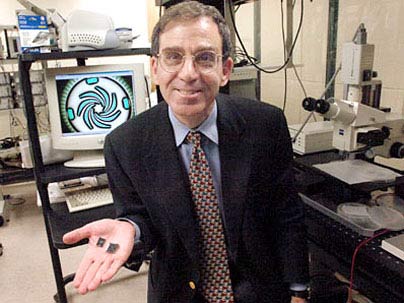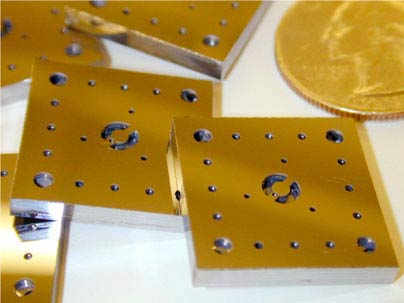Alan H. Epstein and the tiny electrical work
Finding the most efficient power source for mobile devices is now one of the top research areas in the world. Scientists at Massachusetts Institute of Technology (MIT - USA) have successfully researched and developed small on-chip gas turbine engines that can replace batteries that supply power to laptops, mobile phones, radios and both home generators with outstanding usage compared to traditional power supplies.
This can be considered a new breakthrough in the process of researching mobile power sources for the future. Talking about this achievement, it is impossible not to mention the "leader" of the research project - Professor Alan H. Epstein, Director of the Gas Turbine Laboratory, Head of the Department of Astronautics and Aeronautics Studies by MIT.
Graduating with a Bachelor of Aeronautics and Aeronautics Studies in 1971, Alan Epstein did not stop studying and researching to complete the Master's program a year later. In 1975, he received a Ph.D. and began working for MIT from 1980 to the present. Professor Alan Epstein specializes in the fields of electricity generation and energy conversion, turbine engines and gas turbines, including small heat engines, heat transfer in turbines, and scientific research. Researching innovative instruments, hydrogeology, aircraft propulsion systems ...

Successful small gas turbine engine on chip (Image: MIT.edu)
After 10 years of pursuing the "Engine on chip" project, Professor Epstein's small gas turbine engine now can run 10 times longer than the batteries used in laptops, mobile phones, radios and other electronic devices. According to him, this type of motor weighs the equivalent of a battery but after each charge, it can be used for about 15-20 hours.
The operating principle of this engine is similar to the jet engine. An air compressor draws air out and compresses it. The fuel nozzle injects fuel into the compressed air and the mixture catches fire. Epstein engines can work with a variety of fuels such as kerosene, propane gas, ethanol, methanol or hydrogene. The generated hot air spreads rapidly to rotate the turbine, rotating the coil inside the magnet to generate electricity. Typically, a jet engine with thousands of parts is assembled into several parts including compressors, combustion chambers and turbines. Epstein's small gas turbine engine, meanwhile, has only two parts: a movable rotating unit and a fixed structure, capable of acting as an air compressor and a combustion chamber. This engine can fit a matchbox because its combustion chamber is just the size of a pencil eraser and the fuel injectors are holes as small as a dot.
The major utility of this invention is the conversion of thrust and electricity to help save costs, reduce redundancy and standardize. The invention of Professor Epstein and his colleagues were published in the media at the end of September this year and he believes that this mini generator will be commercialized in the next 3 to 5 years.

One of the components of a small gas turbine engine (Image: MIT.edu)
Professor Alan Epstein is currently a member of the Air Force Science and Technology Division of the US Nuclear Management Committee (NRC), a member of the American Aeronautics and Space Academy and the National Academy of Engineering. In addition to the excellent press and presentation awards presented by the International Gas Turbine Institute, Professor Alan Epstein was also honored to receive the Gas Turbine Award from the American Society of Mechanical Engineers - ASME. He owns more than 70 press publications on his research areas. Alan Epstein is also a professor at the R. Colin MacLaurin Institute of Astronautics and Aeronautics.
After 30 years at Massachusetts Institute of Technology, Professor Alan Epstein has made significant contributions to improving the process of researching gas turbines. He is also a pioneer in exploring new research on flexible gas turbine engines with intelligent engines.
In addition, the director of the MIT gas turbine laboratory is always willing to help students, giving them the opportunity to learn and research on large-scale aircraft air turbines. actual conditions. Since 1997, Alan Epstein has specialized in the field of small gas turbines, products that have been manufactured using micro-electrical systems (MEMS) to apply to pocket generators to serve customers. military purpose. And the biggest challenge for turbine researchers of this type is to create designs that can meet functional requirements but remain faithful to small and feasible machine technology.
This year 131 international organizations, from 73 countries, partnered with the PRA in Washington, D.C., and its Hernando De Soto Fellow Prof. Sary Levy-Carciente to produce the 17th edition of the IPRI..
Email: lethisam@wifiebenezer.com.mx
The articles on wifiebenezer.com.mx are collected by us on the internet. If you find any infringing articles, please contact us and we will delete them immediately. Thank you!
Copyright 2004-2024 www.wifiebenezer.com.mx , all rights reserved.